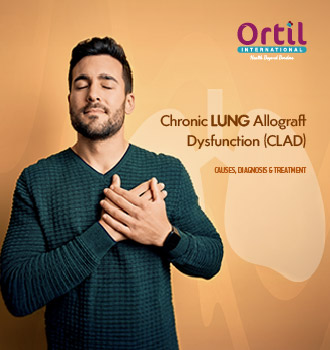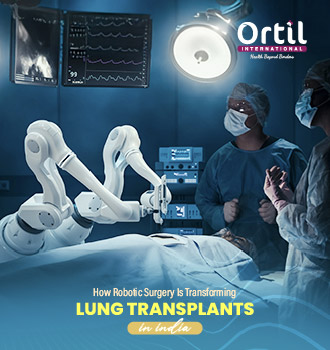Why India Is a Leading Destination for Lung Transplants
Summary
A lung transplant is a critical surgical process that is used to treat patients with end-phase lung diseases such as idiopathic pulmonary fibrosis, COPD, cystic fibrosis and pleural hypertension.
Introduction
A lung transplant is a surgical procedure that saves lives of individuals with terminal stage lung diseases. India has emerged as a leading destination for this complex treatment due to its combination of advanced medical facilities, qualified surgeons and cost-effectiveness.
Understanding Lung Transplant
A lung transplant is a complex procedure performed to replace one or the damaged or sick lungs with healthy lungs of a deceased donor. It is usually considered a last resort treatment option for patients with severe and terminal stages that do not respond to conventional therapies.
What is a Lung Transplant
A lung transplant involves replacing a sick or failed lung with a healthy lung of a donor. Usually it is recommended when other treatments have failed to improve pulmonary function.
Types of Lung Transplant
-
Single lung transplant: substitution of a lung.
-
Double lung transplantation: Both lungs are replaced, common in cystic fibrosis or COPD.
-
Lobar transplantation: A portion (wolf) of the lung is transplanted, sometimes of living donors.
Who Needs a Lung Transplant
Candidates include patients with:
-
Idiopathic pulmonary fibrosis (IPF)
-
Chronic obstructive pulmonary disease (COPD)
-
Cystic fibrosis
-
Pulmonary hypertension
-
Other irreversible lung diseases and in final stage
Pre-Procedure (Preparation Phase)
-
Extensive health evaluations
-
Psychological assessment
-
Blood tests, imaging, and pulmonary function tests
-
Placement on transplant waiting list
-
Counselling and rehabilitation programs
Post-Procedure (Recovery and Follow-Up Phase)
-
ICU stay and hospitalization for 2–3 weeks
-
Immunosuppressant therapy to prevent rejection
-
Regular follow-ups and lung function monitoring
-
Lifestyle adjustments and pulmonary rehab
Why Choose India for Lung Transplant
-
Highly experienced transplant surgeons
-
Hospitals accredited by JCI/NABH
-
Accessible cost compared to Western countries
-
Shorter waiting times
-
English medical professionals
-
Holistic patient care and international services of patients
Top Hospitals in India for Lung Transplant
Cost of Lung Transplant in India
Cost Components
-
Pre-transplant Evaluation and Tests: $3,000–$5,000
-
Transplant Procedure and Hospital Stay: $30,000–$40,000
-
Post-transplant Medications and Follow-up Care: $5,000–$10,000 annually
Total Estimated Cost
The overall cost for lung transplant in India typically falls between $35,000–$50,000, offering depending on the complexity and hospital chosen.
Cost Comparison
Country Average Cost
|
India
|
$35,000–$50,000
|
|
USA
|
$1,000,000+
|
|
UK
|
$150,000+
|
Survival Rates
Survival rates after a lung transplantation are generally promising, with approximately 85% of patients surviving the first year after the procedure. Long -term survival shows a moderate decline, with about 55 to 60% of patients living in addition to five years.
Factors Influencing Success
-
Early diagnosis and transplantation
-
Matting the donor lung
-
Post-transplant care quality
-
Adherence of the patient to medicines
-
General health and fitness
Challenges and Solutions
Challenges:
Solutions:
-
National organ registry systems
-
Advanced immunosuppressant therapy
-
Regular monitoring and patient education
How We Help
-
Personalized Hospital and Doctors Selection
-
Coordination of medical commitments
-
Assistance with the visa process
-
Patient's 24/7 Support and Translation Services
-
Monitoring care management
Legal and Ethical Considerations
-
Governed by the transplant of the law of human organs (Thoa)
-
Only registered hospitals can perform transplants
-
Ethical consent and review processes are strictly followed
Recovery and Life after Treatment
-
Gradual return to normal life in 3 to 6 months
-
Lifelong medicines and health monitoring
-
Nutritional guidance and exercise plans
-
Support and counselling groups
Conclusion
Lung transplants offer renewed life for patients with irreversible pulmonary disease. India stands out globally as a centre of excellence, combining first -rate medical experience with economic care.
FAQs
Q1: Is a lung transplant safe in India?
Yes, when performed in accredited hospitals by experienced surgeons, lung transplants in India are safe and meet international standards.
Q2: How long is the hospital stay post-transplant?
Typically 2–3 weeks, depending on the patient’s recovery.
Q3: Are there age restrictions?
Generally, candidates between 18 and 65 years are considered, but exceptions exist.
Q4: Are lung transplants available for international patients in India?
Yes, many hospitals have dedicated international patient departments to assist with all requirements.













